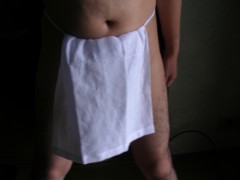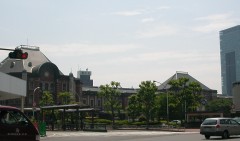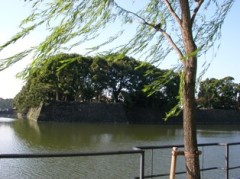12 August 2012
Translated Novel: "Let's Fundoshi" Chapter 1
This is translation of Japanese novel on my Japanese blog site. The original title of the novel was "Nihon Danji wo Yamerarenai (Can't stop being Japanese traditionl man).
A Candadin man experiences FUNDOSHI, Japanese traditional male underwear, swimming suit and custume for festival.
Jacques Charbonneau was a Canadian man born and raised in Montreal, Quebec, Canada. He belogns to majority of that reigion, so called "French Canadian."
From his childhood, he spoke French at home. His parents and relatives were all French Canadians. But he spoke English at school. Half of his friends were Englisha dn the other half were French.
Therefore his native languages were both Englisha and French. He was a billingual but since he entered Tronto University in State of Ontario, one more language was added and then he became tringual. The third language was Japanese.
Why he studied Japanese was he met a Japanese girl named Yuriko Watanabe, whom he fell in love with. She could speak English but he wanted to speak to her directly in her mother's language. The he chose Japanese as his major. With help of Yuriko, he mastered Japanese. His Japanese was excellent so that even Yuriko said that he could speak like Japanese national. He graduated from Japanese department of the university with top rank. After graduation, he started translation and interpretation among English, French, and Japanese. Afterwards, Yuriko became an important job partner and finally a partner in his private life.
When they got married, Yuriko's father, Taizo Watanabe flew to Canada and approved their marriage. The wedding was held in a small church with attendance of small number of people. Taizo was her only family member since her mother was already dead and she was the only child for Taizo.
Jacques wanted to visit Yuriko's hometown but he had been busy for his work and he was too afraid of flying. He could not have chance to visit Japan. He always regretted that he never visited his wife's hometown. He thought he should overcome flying phobia and visit Japan. He could speak Japanese fluently but he could only use it to his wife and Japanese living in Canada.
Yuriko never recommended Jacques to visit Japan. Her hometown was one of most conservative place so localies never welcome a foreign white man like Jaques. She heard that localies did not think her marriage to a foreigner was a good thing. So They thought they did not have to regret it.
But in the third year of their marriage, the couple had to visit Japan. Taizo got sick and was hospitalized. He got out of the hospital but had to stop working and stay home for rehabilitation. A woman who lived nearby sometimes visited him to see how he was but he seemed so depressed that Yuriko should look after him to help him recover his condition.
Yuriko was so worried that the two decided to go there. Translation work could be done even after they moved to Japan as long as they could maintain internet access. They checked the IT environment there and found out there was no problem doing it.
Jacques stood for more than 10 hour flight and finally arrived in Kansai International Airport in Japan. The two travelled to her hometown, Awai Town. The town was on the coastal line of the Sea of Japan in Chugoku region, it was a fishery town. From her home, spectacular ocean view was seen from a window. Taizo gladly welcomed Yuriko and Jaques after a long absence. Taizo was a local fisherman.
They used the room Yuriko had used from her childhood. They started getting along as family. Jacques found Taizo very weak comparing what he saw at the wedding. He got thinner and looked pale. He was as tall as Yuriko but looked smaller than before. He wished he would come back his fishery work afte he regained health. He thought about how to deal with him. Jaques called hime "Otosan (Father)" like Yuriko did.
A week has passed. Things happened as expected. Localies called him "Gaijin (Foreigner)." They spoke about him behind him but they never greeted. They treated hime like outsider. He tried to understand what they said but the language they used was blended with strong accent and dialect. With Yuriko's help. Jacques gradually understood what they said.
Even after they understood the language, living in conservative and closed community was hard for him. Furthermore he was a tall white Canadian. Some stayed away just by looking at him. He was appearently discriminated.
One more troubling thing happened, that was because of season he visited.
Hot and humid climate. It was far different from where he grew up. Even Montreal could get as hot as 30 degree but such hotness was what he never experienced before. It was because of Japan's humidity.
He got sweat very soon. Japanese got used to it but Jacques never resist such wet feeling. He was adapted to the coldness but not such humidity sweating so much.
His body finally responded to it. He got eczema. It was itchy and reditsh. He could not stop scratching. What should he do? He came over to help his father in law recover but he, himself became sick.
Yuriko advised him to see a doctor. The doctor diagnosed his symptom. The result was "latex allergy" in other way, it is called "Rubber allergy."
Jacques asked a doctor "Why did I get such allergy?"
"It is because of underwear you are wearing. The rubber band got soaked and melted down to your skin. Japan's humid summer melted rubber and got into your body that caused allergy symptom. Unless you stop wearing it, it can never be cured."
"You tell me never to wear underwear? Oh, no!" Jacques was shocked to hear that. It was never comfortable living without undewear. Especially for men it was necessary to tighten private zone to stay normal.
"Since you can't wear conventional underwear, we advise patients to wear something else instead" the doctor said showing him white long cloth.
"THIS IS FUNDOSHI".
Continued to Chapter 2.
15:36 Posted in Canada, Culture, My novel, Society | Permalink | Comments (0) | Tags: japan, literature
13 June 2009
Became a free walking tour guide for Imperial Palace
Today, I have become a guide for free walking tour guide for Imperial Palace in Tokyo.
Though I am not a professional guide but I speak English so I joined the volunteer activity.
It was nice. Today I and other two guides started the tour from Tokyo Station.
There were 10 people gathered at the exit. They were from Canada, Australia, Sweden and North Carolina (U.S.A).
After explaining to them history and current renovation plan of Tokyo Station, we took them to Tokyo's most famous tourist spot, Imperial Palace.
We explained to them how the castle was protected from invaders, such as surrounding mort, Stone Walls, Trap gate, and checkpoints.
We talked about middle age to modern time history of Japan as to how the country was developed into a unified nation.
It was sunny and hot day. They really seemed to enjoy the tour.
If you are living in Tokyo or have a chance to visit here, why don't you join the tour.
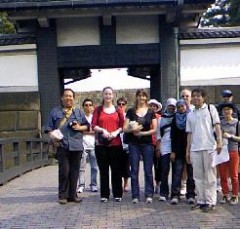
The tour is held every Saturday afternoon at 1PM. Gather at the Marunouchi central exit of Tokyo Station.
Straight-ahead is Imperial Palace.
See you there!!
22:16 Posted in Tokyo Life, Travel | Permalink | Comments (0) | Tags: tokyo, japan, history
02 January 2008
New Year's Day in Japan
HAPPY NEW YEAR! 2008
On the first day of this new year, I visited the city's most famous shrine, Meiji Jingu. It is located in the center of Tokyo in a huge forest park. I had to wait for an hour to get to the altar. In the New Year's Week, they set up special big altar for the huge visitors. When you reach the altar, you throw a coin to make a wish for the new year. The altar becomes like Trevi Fountain in Rome. The sea of coins on the white matt. See the below photo.
There was a huge crowds and so many shops in the shrine. It was almost a big festival going on but if you go out of the shrine and walk on the shopping streets. You can find quiet streets with shattered shops. Usually, Japanese New Year Days are quiet time and holidays for the family gathering like Thanks Giving Holidays in the U.S.
You can see what it is like on New Year's Day in Tokyo on this You Tube site.
The footage shows from the entrance of the shrine to the quite shopping streets. In between it has scenes of waiting crowds forced to view the commercial of Kleenex on the big monitor screen, people walking towards the altar, throwing coins.
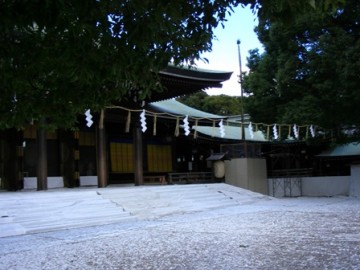
13:40 Posted in Culture | Permalink | Comments (0) | Tags: Tokyo, Japan
22 June 2007
What is good about living in Tokyo?
I have been living in Tokyo, Japan's capital, world's biggest urban area, for more than 7 years.
I feel like I was born and grew up here. Actually I was not born and did not grow up in Tokyo.
Where I was born and grew up was a devastated city, where no culture exists. I hate my hometown.
I used to live in some other cities. One of them is San Francisco. I went to the university there.
It was a pretty city but small and not so exciting.
Tokyo is much bigger. There are some advantages of living in Tokyo, which I like to mention.
1. Very big, varous towns, beautiful places, facilities, and exciting events in one city. You never get bored. If you are alone and bored, you can easily find some places to go to have fun even if you don't have so much money. Just walking on the street is fun.
2. For me, English speaking person, there are a lot of opportunities. Tokyo always needs English speaking workers like me because it has many, many international firms.
3. Very, very sophisticated people, such as journalists, artists, and other intellectuals. I could come to a concert of big artist like Billy Joel. As you know, this is capital of Japan, you can meet influential politicians, too.
4. Many, many foreigners, every day, actually every hour I can easily pass by foreigners. I can encounter different cultures. As I recall, I've met or worked with Koreans, Chinese, Thais, Indians, Brazilians, Russians, Turkeys, Iraqi, Arabs, French, Canadians, Britons, and of course Americans. Some are good but some are not. But I like them.
I love Tokyo. I've decided to live here for the rest of my life. I will die here.
Come visit Tokyo! You can meet wonderful people and see beautiful places.
23:30 Posted in Tokyo Life | Permalink | Comments (1) | Tags: Tokyo, Japan






